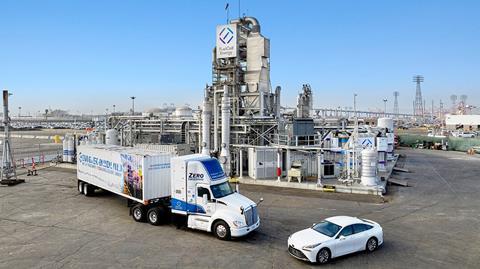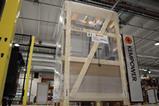Power system manufacturer FuelCell Energy and Toyota have jointly deployed the world’s first “tri-gen” system, designed to transform methane-rich waste gas into clean hydrogen, electricity, and water. This innovative system, now fully operational at Toyota’s main U.S. logistics facility at the Port of Long Beach in Southern California, is expected to benefit the auto giant for the next two decades.

The project, initially proposed in 2017 and constructed in stages, has reached completion and is awaiting local permits to begin full-scale operation. It is designed to convert biogas sourced from agricultural waste and sludge into impressive daily outputs: 2.3 megawatts of electricity, 1,200 kilograms of Hydrogen, and 1,400 gallons of water. Remarkably, this system occupies no more space than three basketball courts.
FuelCell Energy CEO Jason Few explained, “We’re effectively producing carbon-neutral electricity for Toyota, and green hydrogen and water. We think about our platform the same way you might think about a software platform. We can deliver a number of different capabilities, so it’s just a matter of which modules you want to turn on. In this case, we’re turning three of those on to deliver to Toyota.”
This achievement coincides with a growing push in the United States for increased utilization of hydrogen from sources that do not generate carbon dioxide emissions. California, in particular, has been providing incentives for clean power projects, especially in regions like Southern California ports, known for their high air pollution levels. The Biden Administration is also introducing new federal tax credits of up to $3 per kilogram for clean hydrogen, further boosting interest in sustainable energy solutions. Notably, Bill Gates has praised hydrogen as a versatile tool in the fight against rising greenhouse gas emissions.
Toyota, the world’s largest automaker, intends to utilize the hydrogen produced by the tri-gen system for its fleet of Kenworth fuel cell trucks operating at the port and for fuel cell-powered Mirai electric sedans arriving on ships from Japan. Furthermore, the generated electricity will power all of Toyota’s port operations, and the water produced by FuelCell Energy’s system will be used to wash the approximately 200,000 new vehicles arriving annually from overseas plants.
The contractual agreement between Toyota and FuelCell Energy spans 20 years and is expected to reduce CO2 emissions by over 9,000 tons annually. Any excess electricity not consumed by Toyota will be transmitted to the local utility, Southern California Edison, and designated as renewable power for the grid.
Unlike conventional fuel cells used in vehicles, which generate electricity from hydrogen with only water as a byproduct, FuelCell Energy’s platform employs a molten carbonate fuel cell operating at temperatures exceeding 600 degrees Celsius. Jason Few noted that the system built for Toyota is the first of its kind but anticipates future versions to be available for around $35 million.
Few also mentioned the potential for broader applications, stating, “We think this has the opportunity to be deployed not only at ports but in other applications where there’s a need for reliable energy, hydrogen, and water. For example, mining would be a great application,” without specifying additional customers.
To explore a virtual tour of the FuelCell Tri-generation system, visit https://dev2.trigen.groove-tech.com/?cell.


















